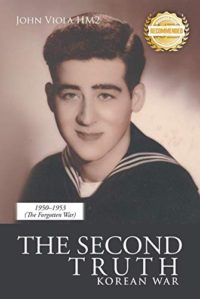Title: The Second Truth: Korean War
Author: John Viola HM2
Publisher: Workbook Press LLC
ISBN: 978-1-954753-53-2
Pages: 66
Genre: Military History, Memoir
Reviewed by: Jason Lulos
Hollywood Book Reviews
The Second Truth: Korean War by author John Viola was a highly enlightening read for several reasons. First and foremost, it dawned on me how little I knew about the Korean War – even though it is referred to as the “forgotten war.” Between the epic conflict which was World War II – and the highly divisive war in Vietnam, the Korean War was (at the time) and remained that “forgotten war.” Hence, the heroes of this war have been overlooked and feel their efforts were not appreciated. In The Second Truth, author John Viola sets out to correct this travesty with a moving and fascinating memoir.
John’s is a captivating story; he writes in a fluid, conversational style. The memoir is short – but that’s because there is no filler. Every line is at least necessary to the context or at most, insightful about the public perception of the war and John’s personal experiences. John’s military career began in Philadelphia where he enlisted in the Navy. After boot camp, he became a hospital corpsman and spent the next 4 years sailing back and forth – from the American west coast to the Far East.
John notes that, at the time, the war in Korea was called a “police action” and not referred to as a “war” until many years later. He intimates that President Truman downplayed the war to quell tensions between the United States and the USSR. This was, after all, a “hot” emergent war (in Korea) of the simmering “cold” war between the two superpowers. So, even at the time, this war was strategically understated by the US government and was therefore not appropriately acknowledged by the general public. John’s story is full of honesty and humility. He notes how he dealt with his fears, hopes, and the physical and emotional highs and lows of life on a destroyer.
The life of a hospital corpsman was always unpredictable: from battle wounds to suicides, to less severe events such as pranks gone wrong and drunken shipmates. John’s concise writing is evocative and sometimes vivid – this is evident in the way he describes things like the mental toll of the war, the rough adjustment upon eventually returning to civilian life, the physical exhaustion of being at sea for days during a hurricane, the reverence he developed for the Japanese people, and sights like the phosphorescent glow trailing in the wake of his ship.
This is a memoir and John’s personal writing style is what makes this such a compelling story. And at only 66 pages, it feels like a much longer work. The book is full of action, harrowing experiences, moving personal anecdotes, and historical eye-openers. John notes it is written for everyone: not just soldiers and veterans. The reader gets brief but evocative glimpses and vignettes about the experiences of war. I highly recommend this memoir because it is a great story. But it also might begin to correct what is, at least for some, an historical blind spot. We have the responsibility to learn and acknowledge the sacrifices of all those who served and those who were lost in the forgotten war. 3

